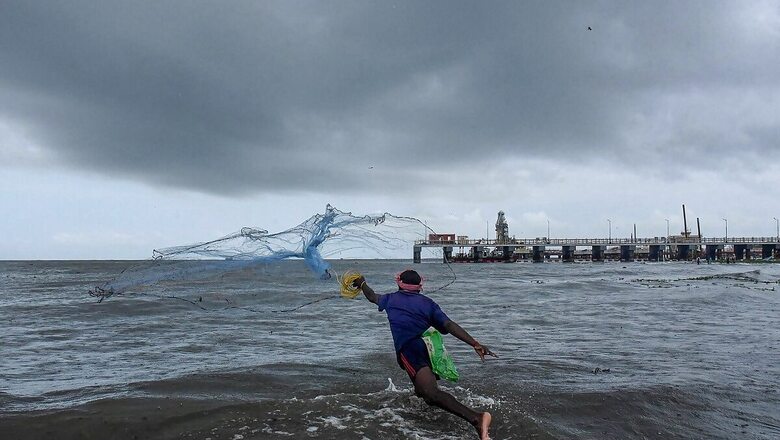
views
A recent Sri Lankan government initiative to dump discarded buses into chosen spots in the sea, to help create artificial reefs for fish breeding has come under criticism from across the Palk Strait. Fishers and experts in the south Indian state of Tamil Nadu have dubbed the initiative as ‘disastrous’, ‘unlawful’, and ‘irresponsible’. They claim that the practice would affect the trade and consumers alike in the coming months and years, thus, adding a new dimension to the intractable ‘fishers issue’ involving the two nations.
The low-intensity row began earlier this month, when the Sri Lankan government, with the help of its navy, dumped close to 20 discarded buses off the waters of the Deft Island, called Needuntheevu in Tamil, declaring that it would help fish breeding and restore the fast depleting marine life. The nation’s Fisheries Minister Douglas Devananda, a Tamil political leader from Sri Lanka’s northern Jaffna Peninsula, claimed that the dumped vehicles would act as artificial reefs, and help the growth of slow-moving fish species and also provide them safety from faster varieties that otherwise fed on them.
In a more recent news conference in Jaffna, the Minister pooh-poohed the suggestions that the practice was ‘unscientific’. Artificial reef making has been in practice in the US since the 17th century and in Japan for over a century-and-half, the local Tamil newspapers quoted him as saying. According to the Minister, such practices had helped fish breeding and increase fish yields.
According to the newspaper reports, Minister Devananda also said that this was not the first time Sri Lanka was trying out this method. Earlier, the government had done it in southern fishing waters. The local fishers reported an increased yield, he claimed. Devananda also declared in context that if needed they would dump discarded train bogies and even ships, if it would serve the purpose.
Other Sri Lankan media reports said that the practice had helped breeding for deep sea fishing, which the nation’s southern Sinhala fishers have been very successful at. In India, if only to avoid mid-sea clashes between the fishing communities from the two countries and to discourage Indian fishers from crossing the International Maritime Boundary Line (IMBL), the Tamil Nadu government has implemented a joint programme with the Centre’s aid, to develop deep sea fishing as an alternative. It is yet to catch up in full swing.
Central Intervention
Not everyone is pleased. In neighbouring India’s southern Tamil Nadu (TN), where local fishers have been at daggers drawn with the Sri Lanka Navy (SLN) chasing them, and at times shooting and killing them, for crossing the IMBL; fishers and experts differ with the Sri Lankan position. Some of their arguments require detailed consideration and may require the Centre’s intervention.
The TN fishers say that their large and costly trawl nets could get caught in the dumped buses and get destroyed. Some of them stick to their known position that Indian fishers continued to enjoy fishing rights across the IMBL. Despite the changes in government and leadership over the past decade, the Centre has been consistent in its opposition to such a position.
According to the Centre, Indian fishers lost their traditional right to fish across the IMBL after the two nations delineated the sea borders through the bilateral pacts of 1974 and 1976. Citing a clause in the 1974 Accord, permitting the Indian fishers to dry their fish in the Katchchativu, which fell within the Sri Lankan side of the IMBL, the former continue to hold that there would be no need for them to dry their nets unless they had become wet—through fishing.
Yet, the question remains what may be applicable, even for argument’s sake, to the waters near the Katchchativu islet that is closer to the Indian shores; if it could be extended to cover the Palk Strait near the Sri Lankan shores. It is in this strait that the Sri Lankan government has now dumped the buses.
However, fisheries experts in Tamil Nadu have since pointed out how during the 2004 Tsunami, a lot of such other debris drifted towards the Indian shores from under the Sri Lankan waters and had to be removed at this end to make the seas safer for the fishers’ boats. They also pointed out that debris of the kind could add toxicity to the marine life in the region.
Considering that the fish schools keep traversing across waters, with no respect for the man-made IMBL, this, for instance, could increase the possibility of the fish that would be eaten by the Indian consumers to have become toxic. The implication is that India has the right and responsibility to protest against such ‘unscientific’ methods.
As may be recalled, Indian institutions, both in the government and the private sector studying fish breeding methods, have adopted near-similar methods to create artificial reefs to help in fish breeding. Experts in Tamil Nadu, however, point out that in all such cases, they had lowered heavy concrete blocks on to the sea-bed, from where underwater currents cannot displace or otherwise disturb them. As they point out, stable reefs, natural or artificial, alone could sustain fish breeding through the medium and long-terms. Sri Lanka’s methods, thus, will not hold.
Contradicting Examples
Not far away from southern Tamil Nadu’s port town of Thoothukudi, experts have since ensured the safety of the Vaan islet, through scientifically-proven conservation measures, leading to an increased fish-presence. Going by degradation caused by unacceptable levels of reef mining for making lime for the construction industry, conservationists had anticipated the islet going under, like a few others before it, by next year. Now they say, the Vaan islet will remain here for a much longer time.
Adding teeth to the Indian experts’ submission is a more recent Sri Lankan media report on how hospital waste and other debris, possibly from the south Indian state of Kerala, has washed up on the nation’s northern shores, not far from where the buses were dropped using cranes. The Island newspaper reported that the recent rains and floods might have carried the hospital waste into the sea and from there, to the Sri Lankan shores.
Interestingly, a delegation of parliamentarians from the main Opposition Samagi Jana Balawegaya (SJB) met with Colombo Archbishop, Malcom Cardinal Ranjith, and appealed to him to intervene and save the southern (Sinhala) fishing community from the multiple threats they face. The Cardinal has been coming out openly against government policies over the past few years, like his Buddhist counterparts in the country. One of the issues where his intervention was sought was related to the recent sinking of a foreign-registered vessel, X-Press Pearl, in Sri Lankan waters, as there is apprehension that the debris could damage fishing boats and destroy fishers’ livelihood.
Licensed Fishing
Even granting that sinking old buses as artificial reefs may be a Sri Lankan government policy for some time now, Minister Devananda got into an avoidable controversy in March this year, when he made seemingly ‘contradictory statements’ on permitting Indian fishers to fish in Sri Lankan waters. First, he said that they would permit ‘licensed fishing’ by identified Indian fishers, arguing that it would bring substantial revenues to the government.
When fishers from his Jaffna, who are the worst affected by ‘Indian poaching’, protested, the Minister reportedly said that they would instruct the navy not to let Indian fishers to cross the IMBL. It was not unlikely given the pending formal decision on his suggestion, a suggestion made not long after he became Fisheries Minister in 2019; Devananda was only indicating the continuance of the existing ban on Indian fishers and bottom trawling.
It still remains to be seen if Indian fishers, even if they were to be granted license, would be interested in fishing without bottom trawling, which is globally accepted as a ‘destructive practice’, banned in Sri Lanka and discouraged in India, too. Devananda then said that they could not move forward with the ‘agreement’ reached with India when he accompanied Prime Minister Mahinda Rajapaksa during the latter’s meeting with counterpart Narendra Modi, owing to the intervening pandemic. It is against this background that the new controversy over the Sri Lankan way of artificial reef making has surfaced.
Humanitarian Manner
The more recent turn in events is related to Colombo media reports that Indian Navy personnel had physically attacked Sri Lankan fishers. However, for long, Indian fishers have been victims of SLN personnel attacking and firing at them, and often arresting them and their boats for violating Sri Lankan waters and poaching.
The Indian Coast Guard and Navy have often looked the other way at ‘innocent’ Sri Lankan fishers ‘poaching’, especially for tuna in their waters. Where the fishers came too close to ‘strategic installations’ like ports and naval bases, they are purposefully shooed away. Occasionally, they are also arrested, produced before local courts in states across south India – and later released through diplomatic interventions, as has been the case with arrested Indian counterparts.
In the current case, the Indian High Commission in Colombo has since denied the charge as ‘blatantly false’. A High Commission spokesperson denied “any such incident”. The spokesperson reiterated that the “Indian Navy is a highly disciplined and professional force which discharges its responsibilities in an impeccable manner”.
India, as may be recalled, is “firmly committed to addressing all fishermen-related issues with Sri Lanka in a humanitarian manner through established bilateral mechanisms and understandings”. It cannot be otherwise as many more Indian fishers are arrested and otherwise harassed than the other way round – given the ground realities, which commences with New Delhi’s respect for the IMBL under the 1964-66 accords.
This article was first published on ORF.
Read all the Latest News, Breaking News and Coronavirus News here.




















Comments
0 comment